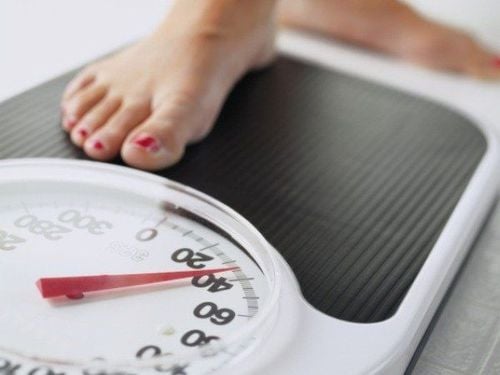This is an automatically translated article.
Parents with obese children often forbid their children to eat or apply excessive diets to their children with the aim of losing weight, but this should be reconsidered. Because the truth is, when children are restricted by their parents, it is easier to snack. Moreover, the harmful effects of giving children an excessive diet can lead to malnutrition, affecting their development or even having an eating disorder when they grow up.
1. Actual situation of weight loss for children
To monitor the health of young children, pediatricians plot the child's body mass index on a growth chart, starting from birth. If the child's weight exceeds the normal threshold, the child will be considered overweight or obese. The risk for this group of children is linked to diabetes, heart disease, high blood pressure, asthma, and sleep disorders as they get older. Therefore, obese children are often recommended scientific approaches such as supervised diet, behavior modification, and exercise.
In fact, children today tend to care about their appearance earlier than previous generations. Indeed, children aged 6 to 8 felt very disgusted with their thighs for being less slim, complaining about their chubby belly and oversized full face. Teenage girls wrongly perceive fat as bad for health.
Research shows that almost half of boys and girls in grades 3 to 6 want to be thinner and about 37% have dieted. These children's motivation is when they are motivated by ridicule at school or by parents who guide children's perception of weight and physical beauty from an early age. Accordingly, many parents have given their children an excessive diet to quickly achieve their child's weight loss goal. Even many obese children have to learn to count the calories in each bite they eat when they put it in their mouth before they know what calories are.
2. Harm when feeding children excessively
If a child's weight is not an issue for health, most pediatric experts warn that the word "diet" should not be used with children or adolescents, because of the health consequences. Physical and psychological may outweigh the benefits. On the other hand, nutritionists have also found that if parents put their children on excessive diets to lose weight, the act of dieting largely leads to more serious weight problems.
Besides, losing weight in children by giving them excessive diets in early childhood can lead to physical problems that are hard to reverse, even years later. One of the most common problems is vitamin and nutritional deficiencies. Overweight children, obese children at this time but will become stunted, slow growth later, delayed puberty and osteoporosis. This becomes a real concern when children on restrictive diets fail to meet their nutritional needs over time. For example, a child's bones will grow rapidly during childhood, often reaching peak mass by the age of 20. Children with calcium deficiency due to excessive dieting by their parents will make their bones brittle and prone to fracture.
In addition, the harmful effects of overfeeding children can include:
Providing so few calories, even a well-balanced diet can slow growth and development; For girls, menstruation may be delayed or temporarily stopped. A lack of protein interferes with muscle growth, while too little fat can interfere with the absorption of fat-soluble vitamins such as vitamins A, D, E, and K. Low birth weight babies have a higher percentage of body fat. Low levels can weaken the immune system, leading to more frequent and persistent illnesses. The low-carb diet discourages foods like potatoes, which provide iron, potassium, B vitamins and vitamin C — all of which are essential for the body to function optimally. multi. And some recent research suggests that a low-carb diet can affect learning, focus and performance in school, because carbs provide energy and help the brain think clearly. Excessive or early dieting can also affect a child's perception of physical appearance, develop an inferiority complex, and an eating disorder as an adult. In particular, anorexia or bulimia can slow growth and cause serious diseases, even death. What's more, nutritionists worry that overeating kids won't teach them healthy eating skills needed for later independent lives.

Cho trẻ ăn kiêng quá mức có thể ảnh hưởng đến sức khỏe của trẻ
3. Measures to lose weight for children are safe for overweight and obese children
Because of the harmful effects of excessive dieting, experts say that the most effective way to keep children at a reasonable weight is to adopt a balanced and calorie-rich diet for the whole family. Instead of focusing on cutting calories, parents need to focus on improving the quality of their diet and making modest changes that can make a big difference, including things like the following:3.1 Set a healthy weight goal for your child Many young children really shouldn't lose weight, as they are still growing it may be acceptable to maintain a slightly higher weight than normal. Older teens can lose between half a pound and 2 pounds a week.
3.2 Say "no" to the right diet and functional foods The first thing that parents need to do is to orient and put their children on a scientifically correct diet. But unless your pediatrician recommends it, avoid overly calorie-restricted menus.
Because if they do, they may not get the nutrients and calories they need to grow. Plus, many diets can make a child's impression that certain foods are "bad," which can change the way children perceive food later in life.
Weight loss pills or supplements are also not a good idea (unless prescribed by your doctor). There is little or no research on how these pills work in children, so they may not be safe.
3.3 Make a healthy diet for the whole family Instead of just applying it to obese children, the whole family should eat a balanced, scientific, healthy diet together to bring more positive effects.
Indeed, pediatric psychologists have shown that children learn all their habits from their parents, both good and bad. This also includes diet. One study found that it was much easier for children to lose weight when their parents were also thinner.
3.4 Start with small steps Don't try to modify the entire family's diet all at once. Instead, try making a few small changes, for example starting with one or two habits each week:
Swap sugary drinks, such as juices and sodas, with water or milk low-fat or fat-free. Make sure your child always has a healthy breakfast. A breakfast with whole grains and protein, such as a piece of whole-wheat toast with peanut butter, will help keep kids feeling full so they don't overeat later in the day. Swap carbs for refined grains, like white bread and white rice, with whole grains, such as wholegrain bread and bran rice. Try to limit eating out or fast food to more than once a week. Buy more fruits, vegetables, and other healthy snacks and less chips, cookies, and candy. Without these calorie-rich foods in the house, kids won't be able to eat them. Keep track of your child's portion sizes. Large plates and glasses encourage children to eat more, so reduce the size of their dishes.

Cha mẹ giảm cân cho trẻ có thể áp dụng bữa sáng bằng ngũ cốc nguyên hạt
3.5 Eat meals together When the whole family sits down together as a family (rather than in front of the TV), parents encourage their children to adopt healthier eating habits.
A study has shown that children who eat three or more meals with their family per week are 20% less likely to eat unhealthy foods and 12% less likely to be overweight.
At the beginning of each week, schedule a few breakfasts, lunches, or dinners together as a family. If possible, involve everyone in planning, shopping, preparing, and cooking meals.
3.6 Encourage children to be active Nutrition experts say children always need 60 minutes of physical activity a day. If your child is not active enough, you need to help your child reach that goal by:
Turn exercise into a family outing, like going for a walk, hiking or biking together. bicycle. Help your child find an activity he enjoys, like soccer, swimming, dancing or simply running around the playground. Encourage your child to spend time outdoors instead of sitting in front of the TV or computer. If these changes have been made and the child is still not losing weight after a few months, parents may need to consult a pediatric weight loss specialist for guidance on a key weight control program. suitable for children.
In short, diets are often good for adults but not necessarily always good for children. When it comes to nutrition, the fact that parents give their children an excessive diet to lose weight by cutting down on unscientific diets will affect the development of children. Accordingly, if children are obese, parents should carefully monitor their children's daily nutrient intake, provide appropriate calorie needs as well as encourage children to be active, which is a safe way to lose weight for children.
Please dial HOTLINE for more information or register for an appointment HERE. Download MyVinmec app to make appointments faster and to manage your bookings easily.













